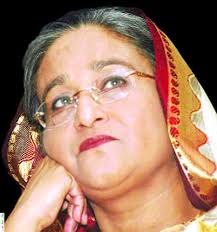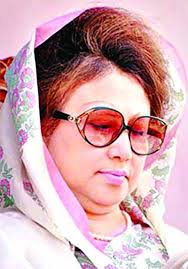My memories of Bangladesh
 |
| |
I remember that there was an army supply depot near the ferry site on the outskirts of Dhaka. I approached the officer in charge of the depot to take one week's rations for my men. I did not tell him that I intended to distribute it to the starving people in the area. He declined. A heated argument took place. I insisted. He then produced vouchers in triplicate and asked me to sign them. We were proceeding into an operational zone, and there was no peacetime accounting and my signing of vouchers would not be questioned.
We distributed the rations for some 200 soldiers at campsites outside Chittagong and Cox's Bazaar to people in need, and proceeded to Arakan. We heard nothing of our unauthorised drawing of one week's rations for 200 men which we distributed to starving people.
There was to be a long gap before I was to get involved again with the people of the future nation of Bangladesh. I arrived at Fort William in May 1969. Events were moving fast in East Pakistan. Sheik Mujib was insisting on the six-point programme that he had spelt out in Lahore in February 1966.
There was a disastrous cyclone on November 16, 1970. The government of East Pakistan failed to take effective relief measures. There was enormous suffering but hardly any remedial measures. It was a case of apathy and indifference towards the suffering of the people by the East Pakistan government. The people in West Bengal were appalled by the callousness of the East Pakistan government.
The elections in December 1970 gave Sheikh Mujib a thumping majority, winning 160 seats in the National Assembly and taking all but two seats in the East. Bhutto's Pakistan People's Party won 81 out of 138 seats in the West. The people and the government of West Pakistan did not want to see Sheik Mujib as prime minister. Yahya Khan announced that the national assembly was to meet in March. This was later postponed. There were hartals and resistance across East Pakistan.
Lt. Gen. Sahebzada Yakub Khan was appointed as governor of East Pakistan. Yakub was mild and considerate to the people. This was not liked by Rawalpindi. Yakub was replaced by the "butcher" Tikka Khan after a month. Incidentally, in August 1947, Major Tikka Khan was a student in the gunnery staff course that I was taking in Deolali. He, with the other Pakistanis on the course, went back to Pakistan. I remember little of Maj. Tikka Khan. I found him then to be unimpressive.
Meanwhile, a concerned Indian government suspended overflights over India. On March 23, Pakistan day, Bangladesh flags were flown all over East Pakistan, and independence was proclaimed.
On the evening of March 25, Yahya Khan flew back to West Pakistan via Colombo. Tikka had issued orders for the crackdown to commence at 0100 hours on March 26. It was called "Operation Searchlight."
Sheikh Mujib made an announcement proclaiming the independence of Bangladesh and exhorted the people to fight until the last Pakistani soldier was driven out. Mujib was arrested at 0100 hours on March 26 at his residence, and flown to Karachi some three days later. Most of the other Bangladeshi leaders escaped and reached India.
I was able to listen with difficulty to the orders being given by tank commanders at Dhaka University -- "traverse left, open window, fire" and so on. Resistance was brutally squashed.
The refugees started to pour in. It was a pathetic sight. They came carrying whatever little possessions they had.
The East Bengal Battalions moved into India. I went to the border to help extricate them when they were trying to enter India. At Benapole, I had deployed an infantry battalion to cover their movement into India. Tajuddin was to hold a meeting with Griffiths, a British member of parliament, at the customs post inside East Pakistan. Pakistani guns were shelling the area.
I urged Tajuddin to leave the customs post, where a Bangladesh flag was flying. We got Tajuddin to safety after the meeting. Pakistani troops were approaching. I ordered the battalion to fire at the Pakistanis who were trying to take down the Bangladesh flag. We did not allow the Pakistanis to remove the flag, which flew throughout until the surrender.
By the end of March, a number of Bangladesh leaders arrived. Prominent among them were Tajuddin Ahmed, Nazrul Islam, Qamruzzaman, Mansur Ali, Col. Osmani and Wing Commander Khondkar. A government in exile was formed. We alloted them a bungalow in 8, Theatre Road. They started to function immediately.
I set up the Mukti Bahini. Initially, 8 camps were organised. Sector commanders were appointed. They directed their fighters with great competence. The Mukti Bahini and the East Bengal battalions played a major and decisive role in the freedom struggle. They attacked the Pakistanis everywhere, and severely damaged their infrastructure. They created an environment that completely demoralised the Pakistan army. Due credit must go to them for their enormous contribution towards the defeat of the Pakistan army and the creation of Bangladesh.
A lightning campaign was launched from December 4. On December 14, Niazi asked for a ceasefire under the UN, and handing over of the government to the UN. This was rejected on December 15 by Bhutto, who vowed to fight on. I drafted the instrument of surrender and, on December 16 at Dhaka, compelled Niazi to accept an unconditional public surrender in front of the people of Dhaka. I made him face the people whom he had treated so badly.
The atrocities committed by the Pakistan army are well documented in Bangladesh. In the space of four hours, a ceasefire was converted into an unconditional public surrender, the only one in history. The Hamoodur Rehman Commission asked Niazi: "General, you had 26,000 troops in Dhaka and the Indians a few thousand outside, and you could have fought on for at least two more weeks till the UN session. Had you fought on even for one more day the Indians would have had to go back. Why did you accept a shameful unconditional public surrender"? Niazi replied that he was compelled to do so by Gen. Jacob, who blackmailed him into surrendering. The state of Bangladesh was born.
Regarding what the future has in store for Bangladesh, I see a vibrant people led by a pragmatic leader Prime Minister Sheikh Hasina, and a rapidly expanding economy. Bangladesh has emerged as a powerful nation, and has become an increasingly important regional power. Bangladesh is now the world's 48 th economic power, and is rising fast to overtake others.
The people of Bangladesh are courageous, hard working and industrious. The economy, earlier based on its farming expertise, particularly of rice and jute, is diversifying into industries and infrastructure. Bangladesh has emerged as a major exporter of textiles and knitwear, outperforming her neighbour India. Jute and leather industries are flourishing.
There are inadequate reserves of oil and gas. However, there are ample reserves of coal. Coal could produce the power required for industries and homes. New coal-based power stations are planned. Regarding the infrastructure, Bangladesh is taking positive steps to accelerate work on roads, bridges, ports, and railways. Roads are being planned to link up with North Bengal, Meghlaya, Tripura and Myanmar along the old Arakan road.
Bangladesh is expanding her maritime resources and projecting her presence aggressively into the Indian Ocean. Bangladesh has a well-trained army, which has made substantial contributions to UN peace keeping.
Finally, I see Bangladesh, under the pragmatic leadership of Prime Minister Sheikh Hasina, emerging as a regional superpower.
General J.F.R. Jacob was Deputy Commander, Eastern Command, Indian Armed Forces, and former Governor, Punjab and Goa, India.
__._,_.___




